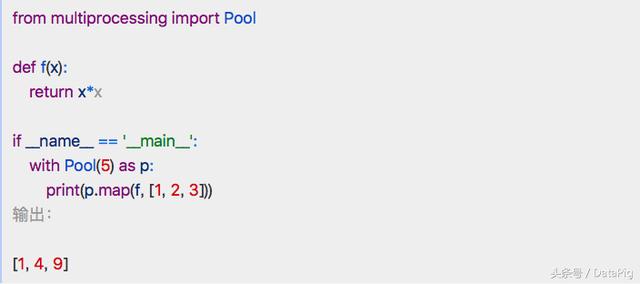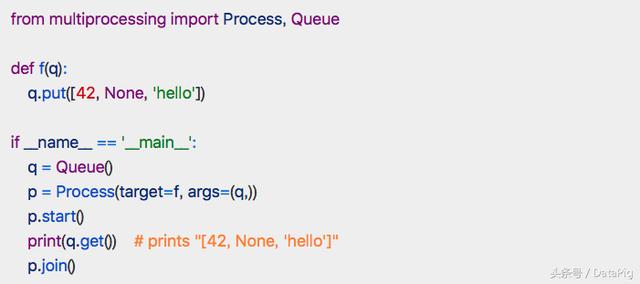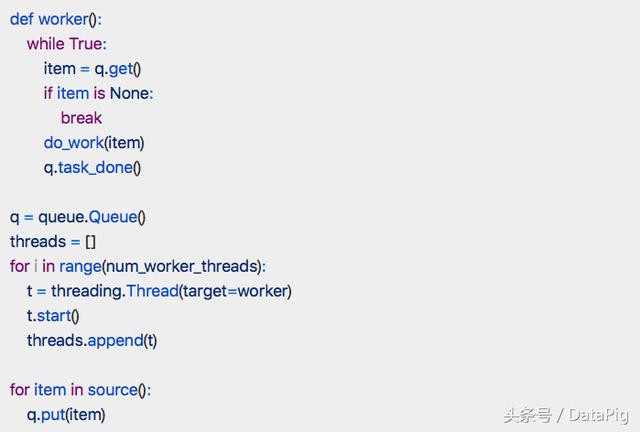高性能Python之:Queue,deq
发布时间:2019-08-29 07:35:01编辑:auto阅读(1953)
-
queue是多线程中的使用的栈,但是Python 解释器有一个全局解释器锁(PIL),导致每个 Python 进程中最多同时运行一个线程,因此 Python 多线程程序并不能改善程序性能,不能发挥多核系统的优势。
-
multiprocessing.Queue是Python 2.6 引入的用来实现多进程的一种高性能栈。
-
collections.deque是为了高效实现插入和删除操作的双向列表,适合用于队列和栈。
Python作为一门脚本语言,有着很多便捷易用的优秀特点,但他也有一个很大的缺陷,就是性能太差,这也是作为脚本语言不可避免的问题,这里我们来学习一些方法,提高Python的性能:
为了大家测试方便,这里同时给了代码的图片版和文字版。
Python虽然不能利用多线程实现多核任务,但可以通过多进程实现多核任务。多个Python进程有各自独立的GIL锁,互不影响。
multiprocessing.Queue
用于多进程:
先来看官方文档:

from multiprocessing import Pool
deff(x):
returnx*x
if__name__=='__main__':
withPool(5)asp:
print(p.map(f,[1,2,3]))
输出:
[1,4,9]
multiprocessing supports two types of communication channel between processes:
multiprocessing支持两种类型的进程间通信方式queues和pips。
Queues
The Queue class is a near clone of queue.Queue. For example:
Queue是queue.Queue的近似克隆。
from multiprocessing import Process,Queue
deff(q):
q.put([42,None,'hello'])
if__name__=='__main__':
q=Queue()
p=Process(target=f,args=(q,))
p.start()
print(q.get())# prints "[42, None, 'hello']"
p.join()
Queues are thread and process safe.
Queues是进程和线程安全的,也就是说,同一时间,只能由一个进程或者线程操作Queues。
queue
先来看官方文档:

def worker():
whileTrue:
item=q.get()
ifitem is None:
break
do_work(item)
q.task_done()
q=queue.Queue()
threads=[]
foriinrange(num_worker_threads):
t=threading.Thread(target=worker)
t.start()
threads.append(t)
foritem insource():
q.put(item)
# block until all tasks are done
q.join()
# stop workers
foriinrange(num_worker_threads):
q.put(None)
fortinthreads:
t.join()
collections.deque
先来看官方文档:
有人对比过以上三者的性能,deque作为一种双向队列性能完胜其他两者。
>>>from collections import deque
>>>d=deque('ghi')# make a new deque with three items
>>>forelem ind:# iterate over the deque's elements
...print(elem.upper())
G
H
I
>>>d.append('j')# add a new entry to the right side
>>>d.appendleft('f')# add a new entry to the left side
>>>d# show the representation of the deque
deque(['f','g','h','i','j'])
>>>d.pop()# return and remove the rightmost item
'j'
>>>d.popleft()# return and remove the leftmost item
'f'
>>>list(d)# list the contents of the deque
['g','h','i']
>>>d[0]# peek at leftmost item
'g'
>>>d[-1]# peek at rightmost item
'i'
>>>list(reversed(d))# list the contents of a deque in reverse
['i','h','g']
>>>'h'ind# search the deque
True
>>>d.extend('jkl')# add multiple elements at once
>>>d
deque(['g','h','i','j','k','l'])
>>>d.rotate(1)# right rotation
>>>d
deque(['l','g','h','i','j','k'])
>>>d.rotate(-1)# left rotation
>>>d
deque(['g','h','i','j','k','l'])
>>>deque(reversed(d))# make a new deque in reverse order
deque(['l','k','j','i','h','g'])
>>>d.clear()# empty the deque
>>>d.pop()# cannot pop from an empty deque
Traceback(most recent call last):
File"<pyshell#6>",line1,in-toplevel-
d.pop()
IndexError:pop froman empty deque
>>>d.extendleft('abc')# extendleft() reverses the input order
>>>d
deque(['c','b','a'])
上一篇: 关于Python的主(main)函数问题
下一篇: Python 访问Facebook (A
- openvpn linux客户端使用
52051
- H3C基本命令大全
51913
- openvpn windows客户端使用
42144
- H3C IRF原理及 配置
38992
- Python exit()函数
33489
- openvpn mac客户端使用
30440
- python全系列官方中文文档
29075
- python 获取网卡实时流量
24106
- 1.常用turtle功能函数
24015
- python 获取Linux和Windows硬件信息
22365
- LangChain1.0-Agent-部署/上线(开发人员必备)
108°
- LangChain1.0-Agent-Spider实战(爬虫函数替代API接口)
142°
- LangChain1.0-Agent(进阶)本地模型+Playwright实现网页自动化操作
158°
- LangChain1.0-Agent记忆管理
147°
- LangChain1.0-Agent接入自定义工具与React循环
167°
- LangChain1.0-Agent开发流程
158°
- LangChain1.0调用vllm本地部署qwen模型
171°
- LangChain-1.0入门实践-搭建流式响应的多轮问答机器人
183°
- LangChain-1.0入门实战-1
183°
- LangChain-1.0教程-(介绍,模型接入)
191°
- 姓名:Run
- 职业:谜
- 邮箱:383697894@qq.com
- 定位:上海 · 松江
